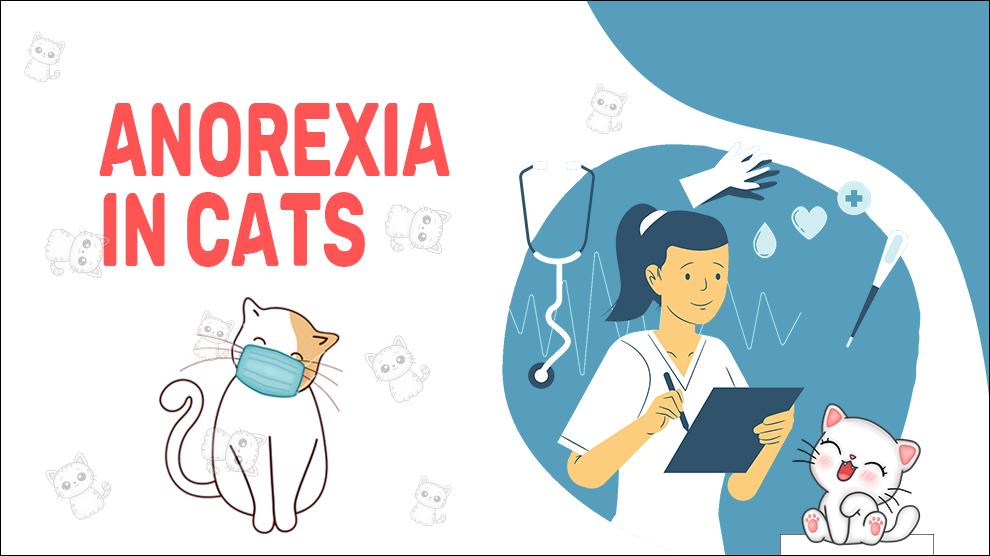What Is Anorexia In Cats?
Anorexia, also known as loss of appetite, is a common condition in cats.
It is characterized by the refusal to eat, which can lead to a wide range of health problems if not treated promptly.
Anorexia can be caused by various factors, including stress, illness, dental problems, and changes in diet.
Clinical Signs Of Anorexia In Cats
Some common symptoms of anorexia in cats include:
- Refusal to eat or drink
- Lethargy or depression
- Weight loss
- Vomiting or diarrhea
- Dehydration
- Weakness
- Unresponsive
- Yellow Skin
- Hiding
- Excessive Saliva
- Lack Of Appetite
- Inactive
Treatment Options For Anorexia In Cats
The treatment of anorexia in cats depends on the underlying cause and severity of the condition.
Some common treatments include:
- Dietary changes: Switching to a different type of food or feeding smaller, more frequent meals may help stimulate appetite.
- Medication: Appetite stimulants or anti-nausea medication may be prescribed to help manage symptoms and promote eating.
- Fluid therapy: Intravenous or subcutaneous fluids may be given to treat dehydration and improve overall health.
- Supportive care: This may include syringe feeding or using a feeding tube to provide nutrition.
- Treatment of underlying conditions: If an underlying medical condition is causing anorexia, such as kidney disease or cancer, it will need to be treated accordingly.
Home Remedies For Anorexia In Cats
It is important to seek veterinary care if your cat is experiencing anorexia as it could be a sign of an underlying health issue.
However, there are some things you can do at home to help encourage your cat to eat:
- Offer a variety of foods: Some cats can be picky eaters and may not want to eat the same food every day. Offering a variety of foods can help stimulate their appetite.
- Warm up food: Warming up food can help make it more appealing to cats and may help stimulate their appetite.
- Use strong-smelling foods: Strong-smelling foods like canned tuna or baby food can help stimulate a cat's appetite.
- Encourage hydration: Offer your cat plenty of water and consider adding water to their food to help increase their hydration.
- Offer small meals frequently: Rather than giving your cat one or two large meals, offer them small meals throughout the day. This can help encourage them to eat and prevent them from becoming overwhelmed by large meals.
How To Prevent Anorexia In Cats?
To prevent anorexia in cats, it is important to provide a healthy and balanced diet, maintain good dental hygiene, keep the litter box clean, and provide regular exercise and mental stimulation.
Stressful situations should be avoided as much as possible, and any changes in diet or environment should be made gradually to reduce the risk of triggering anorexia.
Affected Cat Breeds Of Anorexia
Anorexia can affect all breeds of cats.
Causes For Anorexia In Cats
Causes:
Anorexia in cats can be caused by various factors, including:
- Stress
- Illness or disease
- Dental problems
- Changes in diet
- Medication side effects
- Environmental changes
- Aging
When To See A Vet For Anorexia In Cats?
If your cat is refusing to eat for more than 24 hours, it is important to consult a veterinarian.
This is particularly true if your cat is also experiencing other symptoms, such as vomiting, diarrhea, or lethargy.
A veterinarian can perform a physical exam and recommend appropriate tests to determine the underlying cause of anorexia and develop a treatment plan.
Food Suggestions For Anorexia In Cats
When it comes to feeding a cat with anorexia, it's important to offer them high-quality, nutrient-dense food that is easy to digest.
Here are some food suggestions:
- Wet food: Wet food has a higher moisture content than dry food, which can help keep cats hydrated and make it easier to eat.
- High-protein food: Cats are obligate carnivores and require a diet high in protein. Look for foods that have a high percentage of protein.
- Easy-to-digest food: Food that is easy to digest can help reduce the workload on a cat's digestive system, making it easier for them to eat and absorb nutrients.
Conclusion
Anorexia in cats can be a sign of an underlying health condition and should always be taken seriously.
If your cat is experiencing anorexia, it's important to seek veterinary care to determine the underlying cause.
Treatment will depend on the underlying condition, but there are things you can do at home to help encourage your cat to eat, such as offering a variety of foods and warm, strong-smelling foods.
Feeding your cat high-quality, nutrient-dense food that is easy to digest can also help support their overall health and well-being.











